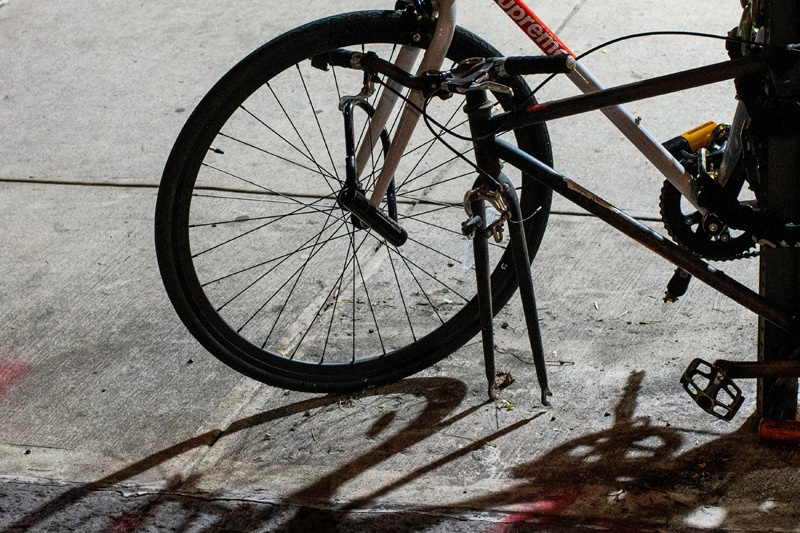 NEW YORK: A bicycle with stolen parts is seen attached to a bike rack in the Manhattan borough of New York. 'A colleague needs help to recover his bicycle!' says a message in the WhatsApp group of the Delivery Boys United, a team of food delivery workers in New York who are organizing to defend themselves following attacks and thefts. - AFP
NEW YORK: A bicycle with stolen parts is seen attached to a bike rack in the Manhattan borough of New York. 'A colleague needs help to recover his bicycle!' says a message in the WhatsApp group of the Delivery Boys United, a team of food delivery workers in New York who are organizing to defend themselves following attacks and thefts. - AFPNEW YORK: "A colleague needs help to recover his bicycle!" says a message in the WhatsApp group of the Delivery Boys United, a team of food delivery workers in New York who are organizing to defend themselves following attacks and thefts. Vicente Carrasco, a 39-year-old from Mexico, formed the group in March after he was assaulted. They aim to protect themselves and their electric bikes, which cost around $3,000 and, along with their phones, are their livelihoods.
Every night after a long day riding around the Big Apple, Carrasco and other "deliveristas," mostly men, meet under the Queensboro Bridge on the Manhattan side of the East River where they wait to come to the aid of any colleague in trouble. "If there is a bicycle stolen with GPS we follow it," he tells AFP, stressing they never go alone. "When there are many of us, we will always try to get it back. We don't want to risk our lives too much. You don't know if people are armed. We do what we can do."
There have been several reports of attacks on delivery personnel in New York this year. In October a 51-year-old rider was stabbed to death and had his e-bike stolen in Chinatown. In April, a deliverista was shot dead in a Harlem. That same month, another on his scooter was hit by a vehicle in Queens. Eric Adams, expected to be elected New York's next mayor Tuesday, has pledged to make the city's streets safer should he take office in January.
For now, Carrasco's group is working alongside three other organizations that bring together more than 1,000 delivery riders across Manhattan, Brooklyn and Queens. "This is my way of life," says another organizer Jose Rodrigo Nevares, whose friend was killed during a theft of his bicycle. "With my bike, I feed my family, I pay my rent. I can't just leave it so someone takes it away," he adds. There are roughly 65,000 deliveristas in New York, according to official figures.
With their frustration building over how police have handled cases, Carrasco and the other groups decided to take safety into their own hands. "We did this because when you call the police when you've been robbed, they never arrive," he says. "We organize ourselves to be able to defend ourselves, to be faster." For its part the New York Police Department says its "Operation Identification" helps recover registered stolen bicycles, and that NYPD duly investigates such crimes.
"The NYPD takes these crimes very seriously and will exhaust all leads available in order to catch those responsible," spokesman Sergeant Edward Riley tells AFP. Some 80 percent of the deliveristas are undocumented immigrants, according to rights groups, meaning they are often reluctant to contact police. Nevares, who became a deliveryman after losing his waiter job during the Covid-19 pandemic, says that reluctance is "out of fear, because you know that you are going to get into trouble."
'Not violent'
While Carrasco's group sometimes recovers stolen bikes on their own, the operations have raised safety concerns. "Our fear is that someone will end up injured," says Ligia Guallpa, from the Labor Justice project, who has been fighting for years to improve conditions for undocumented workers.
Many who support the workers distance themselves from the self-defense groups. But Carrasco dismisses suggestions that the men are vigilantes. "We are not violent," he states. Food delivery workers - many of whom are of Latino, African or Asian origin - average $2,345 a month, below the hourly $15 minimum wage in New York's service sector. They receive no social security, no health insurance and no overtime. Nor do they have a right to unionize. Guallpa calls the working conditions "inhumane."
Only from next year will they be allowed to use the restrooms of restaurants where they collect food, after a campaign by Guallpa's organization. Revenue from food delivery apps has surged more than 200 percent over the past five years, with profits skyrocketing during the lockdown. It's been a win-win for the apps, which earn fees from customers and restaurants while having no commitments to the freelance deliveristas, according to a 2020 survey conducted by the Labor Justice Project and Cornell University.
Activists say it's time to give the riders the same protections as other workers. Almost half of the survey's 500 respondents said they had had an accident, including being run over, while working - and three quarters of those paid their medical expenses themselves. Fifty-four percent of respondents had their bicycles stolen - and one third of them had been victims of assault during the robbery. "We have to change the system, otherwise we are not changing the root problem," says Guallpa. - AFP










